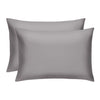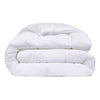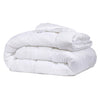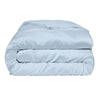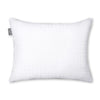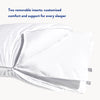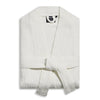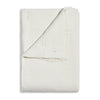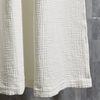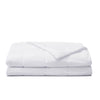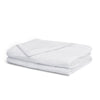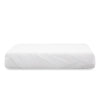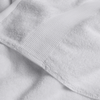
If you’re frequently waking up to tangled sheets or struggling with corners that won’t stay in place, you might be wondering: why do my bed sheets keep coming off? This is an experience shared by millions of people around the world, so let's address how to solve this problem. From choosing the right fitted sheet size to simple bedding hacks, keeping your fitted sheets firmly in place doesn’t have to be a nightly challenge. In this article, we'll discuss fitted sheets, how to find the right size, and ways to keep your sheet securely fastened to the bed.
What is Bed Sheet Slippage?
Bed sheet slippage, commonly experienced as sheets coming off repeatedly, is a frustrating problem that many people encounter every night. This happens when your sheets, even fitted sheets, continually come untucked from the mattress corners as you change sleeping positions throughout the night. Several factors contribute to this issue, including worn-out elasticity in the fitted sheet’s edges, the fabric type (since some materials slip more easily), mattress depth, and even how the fitted sheets are initially fitted. This persistent slippage isn’t just irritating; it disrupts your rest, causing discomfort and impacting sleep quality. Additionally, it leads to the hassle of re-making the bed frequently.
Why Do My Bed Sheets Keep Coming Off?
The continuous slipping of fitted sheets stems from a combination of wear and physical factors. A key contributor is the degradation of the fitted sheet’s elastic band, which loses strength after repeated washing, reducing its ability to grip the mattress firmly. Mattress depth also matters; deeper or thicker mattresses can challenge a fitted sheet’s hold, especially if you’re not using deep-pocket fitted sheets. Fabric plays a role, too! Silk or satin fitted sheets, despite their luxury feel, tend to slide more than cotton or flannel. Even how you put on the fitted sheets affects grip: stretching them too tight or not securing all corners properly can cause slippage.
How To Keep Your Bed Sheets From Coming Off Overnight
Step 1: Choose the Right Size Fitted Sheet
Selecting the correct fitted sheet size is essential to preventing slippage. Accurately measure your mattress depth first. Standard fitted sheets typically fit mattresses up to 14 inches deep, while deep-pocket fitted sheets accommodate thicker mattresses or those with a mattress topper. Using an undersized fitted sheet will result in the sheet frequently popping off the mattress, while oversized fitted sheets bunch and slip. Make sure you know your mattress size before buying as properly sized fitted sheets deliver a more secure and comfortable fit.
Step 2: Ensure a Snug Fit at All Corners
When placing your fitted sheet, make sure all four corners are tightly tucked under the mattress. Start with one corner, then move to the diagonally opposite corner to evenly distribute tension. Next, secure the remaining corners, adjusting to eliminate any slack. Fully enveloping each corner strengthens the fitted sheet’s hold and greatly reduces the chance of it coming undone during movement. Though it might take an extra minute, this careful method ensures fitted sheets stay put.
Step 3: Utilize Bed Sheet Suspenders, Sheet Clips, or Stretchy Bands
Bed sheet suspenders, sheet clips, or stretchy bands offer practical fixes for stubborn slippage. These attach to the fitted sheet edges beneath the mattress, creating a firm grip. Available in elastic clip designs, adjustable bands, or stretchy bands, they’re easy to install by clipping or fastening evenly around the mattress. These suspenders add extra security, helping your fitted sheets remain firmly in place all night long.
Step 4: Consider Using Rubber Sheet Grippers or Safety Pins
Rubber sheet grippers are small adhesive pads that increase friction between the fitted sheet and mattress. Placing them under the fitted sheet’s corners offers a discreet and cost-effective solution for mild slippage. For best results, ensure your mattress surface is clean and dry before applying. Replace the grippers periodically to maintain their effectiveness. For a quick DIY solution, safety pins can be used to temporarily secure the fitted sheet to the mattress or mattress protector, but use them with care to avoid damaging fabric.
Step 5: Wash Fitted Sheets Less Frequently
Frequent washing weakens fitted sheets’ elasticity, contributing to slippage. Typically, washing fitted sheets once every one to two weeks is sufficient. When laundering, use a gentle cycle and mild detergent, avoiding harsh chemicals or bleach that damage fibers. Over-washing breaks down elastic bands and fabric, reducing the fitted sheet’s ability to grip the mattress.
How Long Does It Take To Secure Fitted Sheets Against Slipping?
Securing fitted sheets to prevent slippage requires minimal extra time. Implementing practical steps like fitting the fitted sheets properly, using bed suspenders, sheet clips, or applying rubber grippers usually adds just 2 to 5 minutes to your bed-making routine. For comprehensive adjustments, including selecting properly sized fitted sheets and installing suspenders or stretchy bands, expect to spend about 10 to 15 minutes initially. After setup, maintenance is easy and well worth the effort for consistently comfortable, uninterrupted sleep without constantly fixing slipped fitted sheets.
What Tools Do You Need To Stop Fitted Sheets From Coming Off?
Fortunately, stopping fitted sheets from slipping doesn’t require expensive or complicated tools. Start with a correctly sized fitted sheet that matches your mattress and mattress topper, if you use one. Additional helpful tools include bed sheet suspenders, sheet clips, stretchy bands, safety pins, or rubber sheet grippers, which are affordable and easy to find online or in stores. A fabric tape measure helps ensure accurate mattress depth for proper sizing. For persistent problems, specialty mattress grip pads or a textured mattress protector offer enhanced friction. These simple, accessible tools can quickly solve the frustrating issue of fitted sheet slippage.
Why Do My Fitted Sheets Keep Coming Off Even After Washing?
Fitted sheets may continue slipping after washing due to several reasons. Detergent residue can coat fabric fibers, reducing grip. Frequent use of fabric softeners often leaves a slick finish that promotes slippage. Additionally, repeated washing, especially in hot water, can permanently weaken elastic bands, lessening their hold. A worn or coated mattress surface or mattress topper can also reduce the friction needed to keep fitted sheets in place. These combined factors contribute to ongoing slippage despite laundering efforts.
Can Different Bed Sheet Materials Prevent Fitted Sheet Slippage?
Absolutely, fitted sheet material plays a significant role in preventing slippage. Textured fabrics like cotton and flannel naturally grip the mattress better than slick materials such as silk or satin. Linen is another excellent choice, valued for its durability and slight texture. Fitted sheets with higher thread counts typically retain shape and elasticity longer, offering consistent performance. Sheets made with 100% cotton are a great choice, like this Miracle Made sheet set.
How Do Bed Sheet Suspenders, Sheet Clips, or Stretchy Bands Help Prevent Fitted Sheets From Coming Off?
Bed sheet suspenders, sheet clips, and stretchy bands enhance fitted sheets’ grip by providing additional tension underneath the mattress. They attach to the fitted sheet’s corners or sides, preventing lifting or slipping during movement. This is especially helpful for deep mattresses or those with a mattress topper, unless you have fitted sheets to match that depth which is often not the case. Suspenders and stretchy bands evenly distribute pressure, reducing stress on elastic edges. When properly installed, they secure your fitted sheets firmly, breaking the frustrating cycle of constant re-making and improving your overall sleep quality.
What Are The Best Long-Term Solutions For Keeping Fitted Sheets Secure?
For lasting results, use a combination of strategies to keep your fitted sheets secure and comfortable night after night:
-
Invest in high-quality, properly sized fitted sheets made from durable materials like cotton or linen.
-
Rotate multiple fitted sheet sets to extend their lifespan and reduce wear on any single set.
-
Regularly inspect the elastic for signs of wear and replace fitted sheets as needed.
-
Use bed sheet suspenders, sheet clips, or stretchy bands to add extra security when necessary.
-
Add a mattress protector or mattress topper to increase texture and grip on the mattress surface.
-
Minimize wash frequency and use gentle detergents to help preserve the elasticity of your fitted sheets.
Common Mistakes To Avoid
-
Using Incorrect Fitted Sheet Size: Using fitted sheets that are too small or too large is a leading cause of slippage. Always measure your mattress and mattress topper accurately and select the corresponding fitted sheet size.
-
Over-Washing Fitted Sheets: Excessive washing damages fitted sheet elasticity. Limit washing to once every one or two weeks to maintain fit.
-
Ignoring Mattress Depth or Mattress Topper: Thick mattresses or mattress toppers require deep pocket fitted sheets. Neglecting this detail almost guarantees slippage.
-
Neglecting Elastic Check: Regularly check elastic bands for wear and tear. Replace worn fitted sheets or use bed sheet suspenders, sheet clips, or stretchy bands to prevent slippage.
-
Using Harsh Detergents: Strong chemicals and bleach harm fabric fibers and reduce grip. Opt for gentle, mild detergents instead.
Conclusion
Making sure your fitted sheets actually fit your mattress can make a big difference. Also, there are a few simple things you can try, like using sheet clips, suspenders, or a mattress protector, to help keep everything where it belongs. With a couple of these tweaks, you can finally stop fussing with your bedding and just settle in for a good night’s sleep.
If you’re looking for an upgrade, consider trying Miracle Made fitted sheets. They’re designed to fit snugly, feel super comfortable, and actually stay in place, no matter how much you move around at night.
Sources:


